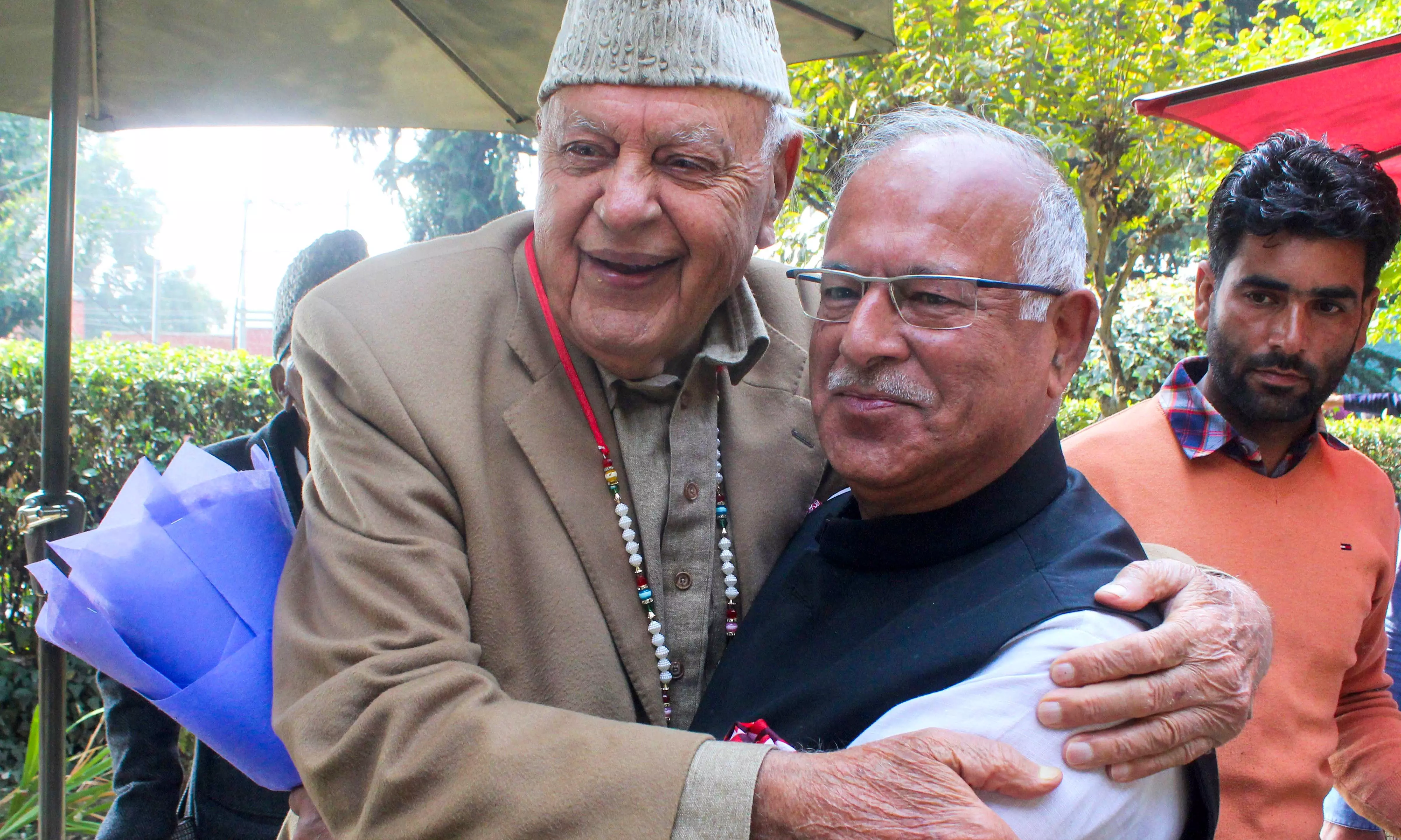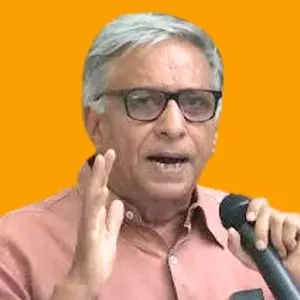
- Home
- India
- World
- Premium
- THE FEDERAL SPECIAL
- Analysis
- States
- Perspective
- Videos
- Sports
- Education
- Entertainment
- Elections
- Features
- Health
- Business
- Series
- In memoriam: Sheikh Mujibur Rahman
- Bishnoi's Men
- NEET TANGLE
- Economy Series
- Earth Day
- Kashmir’s Frozen Turbulence
- India@75
- The legend of Ramjanmabhoomi
- Liberalisation@30
- How to tame a dragon
- Celebrating biodiversity
- Farm Matters
- 50 days of solitude
- Bringing Migrants Home
- Budget 2020
- Jharkhand Votes
- The Federal Investigates
- The Federal Impact
- Vanishing Sand
- Gandhi @ 150
- Andhra Today
- Field report
- Operation Gulmarg
- Pandemic @1 Mn in India
- The Federal Year-End
- The Zero Year
- Science
- Brand studio
- Newsletter
- Elections 2024
- Events
- Home
- IndiaIndia
- World
- Analysis
- StatesStates
- PerspectivePerspective
- VideosVideos
- Sports
- Education
- Entertainment
- ElectionsElections
- Features
- Health
- BusinessBusiness
- Premium
- Loading...
Premium - Events

Tariq Hameed Karra seems unable to see in the larger frame the political sequence of events orchestrated by BJP step by step in a diabolical fashion since 2018
The Congress, as a part of the INDIA bloc and the National Conference-led political alliance, ascended to power with a thumping majority in the recent Jammu and Kashmir Assembly election, riding the crest of popular goodwill. So, what's wrong with it now?
Why does the party seem to be on autopilot — in a way that may create more hurdles in the restoration of statehood for J&K than already exist, thanks to the beneath-the-surface hostility of the BJP and the Narendra Modi regime?
NC’s legacy in Kashmir
The NC is a legacy party of J&K, and it was primarily on account of its resistance and mass appeal, rather than any other singular factor, that Kashmir didn’t go over to Pakistan in 1947.
Subsequently, the NC, led by its iconic leader Sheikh Mohammed Abdullah, endorsed the terms of accession to India that Maharaja Hari Singh, then the head of the independent kingdom, arranged with India led by Jawaharlal Nehru and his stalwart colleagues such as Vallabhbhai Patel.
At the heart of these terms was constitutional autonomy for J&K proposed by the Maharaja, which came to be codified as Article 370 of the Indian Constitution. This special Article had eroded in practice over time, but under the guidance of the RSS ideology, Prime Minister Narendra Modi forcibly ended it on August 5, 2019, and then took a series of repressive and militaristic measures against the civilian population of the Valley to snuff out any possibility of resistance that some feared may follow.
Also read: Article 370 resolution row: Ballistic Modi, defensive Omar and bumbling Congress
Five years of silence
J&K has smarted under the insult, which was worsened by the reduction of its status from a full-fledged state to a Union Territory.
Although known for its political volatility, Kashmir did not react to the rough military treatment meted out to it for many months after the abrogation of Article 370.
In October 2019, when I was in Kashmir to write about the post-abrogation situation, people said to me, “We don’t want to become target practice for the Indian Army!”
These were piercing words. The people were sullen, keeping their counsel to themselves.
Speaking through the ballot, but a close shave
Five years on, they had their say through the ballot box, massively voting for NC against all expectations — and ensuring that the Centre’s 2019 move of taking away autonomy and splitting the state into two UTs (J&K and Ladakh) was getting a big thumbs down. Not a shot was fired.
The flipside was this: Had voting been along the usual local lines or strict party affiliations, the splintering could easily have led to the emergence of the BJP — which did extremely well in the Jammu division — as the first party agonisingly close to the halfway mark.
The rest could easily have been secured with the help of Independent candidates (many being Jamaat-e-Islami in disguise) and some other separatist elements.
And that would have been a ringing endorsement of the Modi regime’s arbitrary actions of August 2019.
A sad chapter in judicial history
The Supreme Court, in which people initially appeared to show faith, lay low through much of this, avoiding taking up the vital matter of the mauling of the Constitution.
And when it did wake up to consider it after an inordinate wait, which permitted the government to create new facts on the ground, the top court broke people’s heart — and not just in Kashmir.
Few felt that justice was done, other than regime apologists and propagandists. It was a sad chapter in our judicial history.
The electoral verdict of the people has made a mockery of not just the Centre’s egregious action but also of the apex court judgment which was beyond comprehension, much like the Ayodhya judgment.
Watch: Jammu and Kashmir: Has BJP closed doors on all dialogues?
Two crucial steps
This is the historical, political and ideological background of the two seminal steps taken by the Omar Abdullah government within a few days of taking office.
On day one, the state Cabinet passed a formal decision to work in earnest for the restoration of statehood. And just a few days later, the government moved a resolution in the Assembly seeking to restore J&K’s constitutional autonomy (lost through the abrogation of Article 370), with only the BJP bloc voting against it.
This was no ordinary Assembly election. The NC and its main regional rival PDP (also in the INDIA bloc nationally but not in the 2024 Kashmir Assembly poll), now considerably weakened on account of defections from it encouraged by the Centre, campaigned with the demand for the restoration of statehood. The people decided to go with the time-tested NC, Sheikh Abdullah’s party.
Also read | Abrogation of Article 370: Historical blunder with colossal consequences
This was obviously a deeply considered decision. Here was a party with a cross-Kashmir appeal the voters could rely on, a party that had sacrificed the most when terrorism looked to carry the day in the late 1980s and early 1990s, with the security forces fighting against Pakistani elements with their backs to the wall.
When it was widely thought that the BJP, to manoeuvre its way to power in J&K for the first time since Independence, was not above encouraging divisions and splits in Kashmir and promoting even separatists and soft separatists (who had once gone with terrorists) to achieve this end, the people chose to take matters in their own hands to thwart the Hindutva party’s ambitious and devious agenda.
A moment of resurrection
The constitutional autonomy of J&K had been a matter of agreement between Maharaja Hari Singh and the Government of India, and was underwritten at its birth by Sheikh Abdullah, the NC founder-leader also referred to as Sher-e-Kashmir or the Lion of Kashmir, whom neither Muhammad Ali Jinnah nor Pakistani invaders had been able to break.
The Modi regime had broken that legacy created jointly by Maharaja Hari Singh, the Government of India, and the National Conference in the wake of an invasion from across the border.
The defeat of Modi’s move through the ballot box is, therefore, no less than a moment of the resurrection of a crucial hour in the history of Independent India, as well as of the kingdom of J&K, a history underwritten by people power rallied on a long-term basis by Sheikh Abdullah.
Also read: No power in the world can restore Article 370 in J&K: PM Modi
It is an irony of fate, and sorry evidence of strategic shortsightedness, that the Congress in Kashmir has simply failed to grasp the real meaning of the grand election win that swept it to a political high fuelled by the NC’s political firepower.
Its state president Tariq Hameed Karra, through irresponsible utterances lately, some 10 days after the Assembly passed the resolution on regaining J&K’s constitutional autonomy, has chosen to question the wording of the resolution in the same shallow way as the separatists and crypto-separatists do, and played right into the BJP’s hands.
Questions to be answered
Is Karra’s party still a willing part of the winning alliance or not? Is the J&K Congress president on autopilot, or has he gone rogue?
Worse, is he following instructions from the Congress’s central leadership? That would amount to running with the hare and hunting with the hound. J&K is at a sensitive conjuncture. An explanation is called for.
It was clear that the Modi government would not have given back J&K’s constitutional autonomy but it would have restored its statehood if the BJP contrived to come to power.
If that weren’t the case, the handsome election results in favour of the pre-eminent party campaigning for the restoration of statehood would mean nothing to the Prime Minister. It’s evident that such a situation could lead to a long-drawn political struggle, which could assume a national form.
L-G’s dubious conduct
The Centre’s agent, the Lieutenant-Governor, may have given the game away when he led the function on October 31 to celebrate J&K’s “Union Territory Day” — an event disregarded by all parties other than the BJP because it was an outright travesty and amounted to a rejection of the just-expressed people’s will.
Using unbecoming and disrespectful language, L-G Manoj Sinha accused the Valley parties, including the ruling NC, of having a “dual character”.
What does a mere agent of the Centre in a federal set-up mean by this, especially when the Supreme Court accepted at face value Union Home Minister Amit Shah’s statement in Parliament that the UT’s statehood would be restored? It should essentially mean restoration at the earliest and not at the whim and political convenience of the Centre.
Also read: MLAs come to blows in J-K Assembly over special status resolution
The L-G’s conduct has, for long, been reminiscent of the autocratic British-era Resident or Political Agent. In all conscience, can the L-G obstruct the ruling party from fulfilling its election-time promise, which was to immediately strive for the return of statehood at the earliest and sweep aside the UT status forced through the barrel of the gun?
An operation designed to scuttle people’s wishes
Regrettably, Karra was unable to see in the larger frame the political sequence of events orchestrated by the BJP and the Centre step by step in a diabolical fashion since 2018, starting with the pulling down of the Mehbooba Mufti government through a coup-like strike.
Since then, every step taken has been the unfolding of a political operation designed to scuttle the wishes of the people duly recorded through a proper vote.
The J&K Congress chief gives the impression of not showing the perspicacity needed of a leader of a national party in a sensitive and politically besieged border area.
(The Federal seeks to present views and opinions from all sides of the spectrum. The information, ideas or opinions in the articles are of the author and do not necessarily reflect the views of The Federal.)


